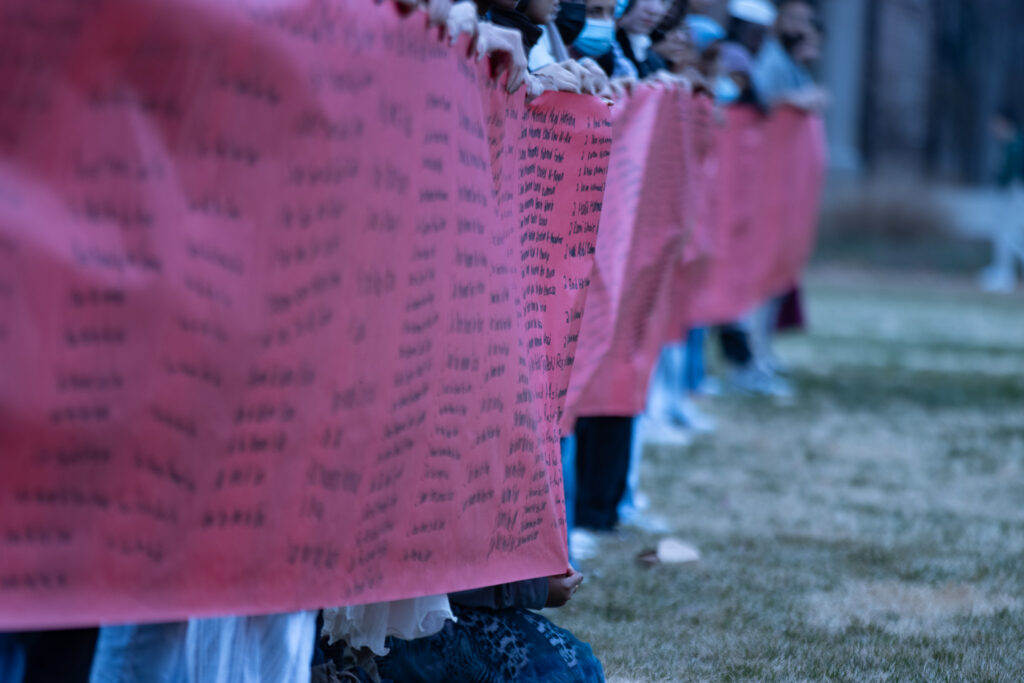Israel-Hamas War | News
MSA holds “Say Their Names” event on Mudd Field

Demonstrators unroll a banner with thousands of names on it at the event on Mudd Field. (Jamie Nicholson | Student Life)
Washington University’s Muslim Student Association (MSA) organized a “Say Their Names” demonstration on Mudd Field, Dec. 8. As part of the demonstration, MSA unrolled a paper banner with the names of over one thousand Palestinian children who have been killed in the latest Israel-Hamas war.
The event was organized as part of MSA’s annual Sadaqa Week, during which the group raises money for an organization of their choice. This year, they chose the Palestine Children’s Relief Fund. Along with the Say Their Names event, MSA held a bake sale, basketball tournament, and banquet dinner for Sadaqa Week.
The demonstration followed a pro-Palestine protest organized by the Coalition of WUSTL Students for Palestine, Dec. 7. Junior Rahaf Hamzeh, public relations chair of MSA, said that their group acted independently of the Coalition. “This is very MSA-affiliated,” she said. “We didn’t really correlate with them.”
The demonstration began with the unraveling of the poster, which stretched just under halfway across the width of Mudd Field, from near the DUC towards Bauer Hall. Hamzeh gestured to the poster.
“Look at how many names that we have of the children that have been dead,” she said. “And what about the children that are still living? What about the children that are still dreaming? How are they ever going to recover from this?”
A closed list of speakers with personal connections to Palestine told stories about their own and their families’ experiences. Speakers consisted of students, as well as local St. Louis community members.
Hamzeh spoke about her grandparents who lived in Palestine, and gestured to the keffiyeh around her shoulders, saying it was her grandfather’s.
“I hope that one day I will be able to go back [to Palestine] and wear this proudly without fearing that I will be shot and killed by IDF,” Hamzeh said.
Another speaker, third-year law student Caitlin who asked not to use her last name for fear of being doxxed or blacklisted, described a visit to Nablus with her father to visit family when she was 16.
“The story that I will tell you is a little bit traumatic, but it is nothing compared to some of the stories that other people have,” she said.
Caitlin said that it took her family seven hours to cross from the Jordan checkpoint into Palestine.
“They had my passport, my American passport for at least two hours before I got it back, with the implicit threat that they would keep it.”
She pulled out two pieces of paper from her pocket. On them were names of her extended family in Gaza.
“I have written down every name confirmed from the Al-Astal family that has died, and I added another name just on Tuesday,” Caitlin said. “There are 89 names.”
Three other St. Louis community members also spoke about their experiences in Palestine and their families currently residing there.
One of them was Hasan Wadi, a member of the St. Louis community who grew up in Palestine and emigrated to the United States in 2006.
Wadi said that his cousin, an OB-GYN physician, died in Palestine during an attack on Nov. 10. Wadi called his cousin and told him to evacuate the hospital, fearing that it would be bombed. His cousin stayed to help the sick, pregnant women, and babies.
“That was the last conversation between me and my cousin,” he said.
When the speakers finished, a senior MSA member took the microphone and announced to the group that they would not use chants discouraged by the University, referring indirectly to the post from Chancellor Andrew Martin in which he discouraged the use of the phrase “from the river to the sea, Palestine will be free.”
On his University blog, Martin wrote that “To use that phrase, particularly in circumstances where we know it will have a harmful impact, is well beneath the dignity of every member of our community.”
Dean of Students Rob Wild, along with multiple people from the Student Affairs and the Demonstrations and Disruption team, were present for the event on Mudd Field. Wild said he had worked with MSA for the past two weeks to plan and strategize the event.
Technically, he said, the phrase was not banned on campus.
“I appreciated [the Chancellor] making that blog post and clarifying the University’s values on that. But if you read the way his statement was worded, he did not say that we have a policy against saying that phrase,” Wild said.
The senior who began the chants said that MSA wanted the focus of the event to be on the Palestinian names they wrote on the poster.
“We didn’t want to make anyone feel unsafe on campus or feel like that we were calling for something violent or calling for something negative. Because a lot of times, small things get picked at and like the truth, the bigger meaning of the event gets undermined,” he said.
Instead, protestors cycled through other chants:
“Free, free Palestine!”
“Hey hey! Ho ho! The occupation has got to go.”
“Not another nickel, not another dime, no more money for Israel’s crimes!”
“Ceasefire now!”
The demonstration ended with senior Usma Rizvi, who helped organize the event, speaking about the remaining events in MSA’s Sadaqa Week and asking that people attend.
“Make sure you are staying [as] loud and vocal as ever,” Rizvi said.
Speaking to Student Life after the event, Rizvi said that she felt the event was a success and described the process of making the banner.
“I think the turnout was really good,” she said. “We had a bunch of different volunteers [help to create the banner]. It was honestly very emotional to have people come write down names.”
Jared Adelman contributed reporting to this story.
